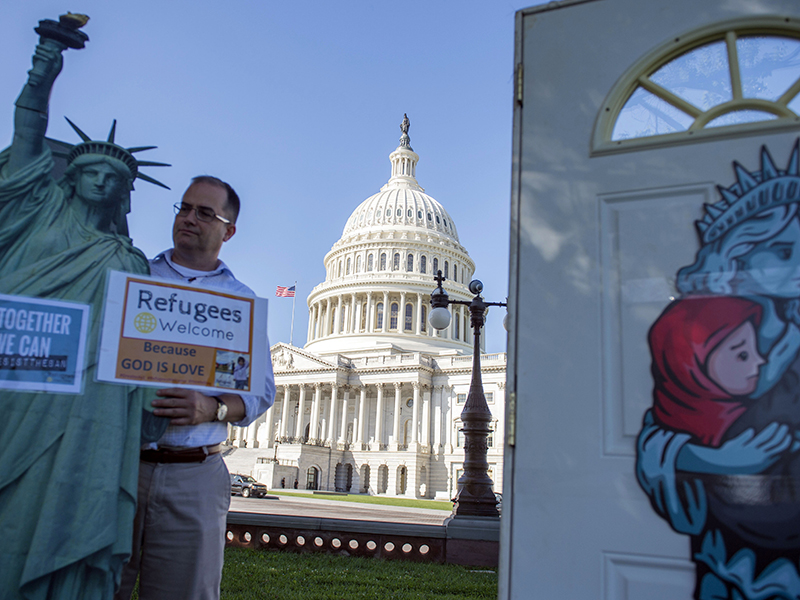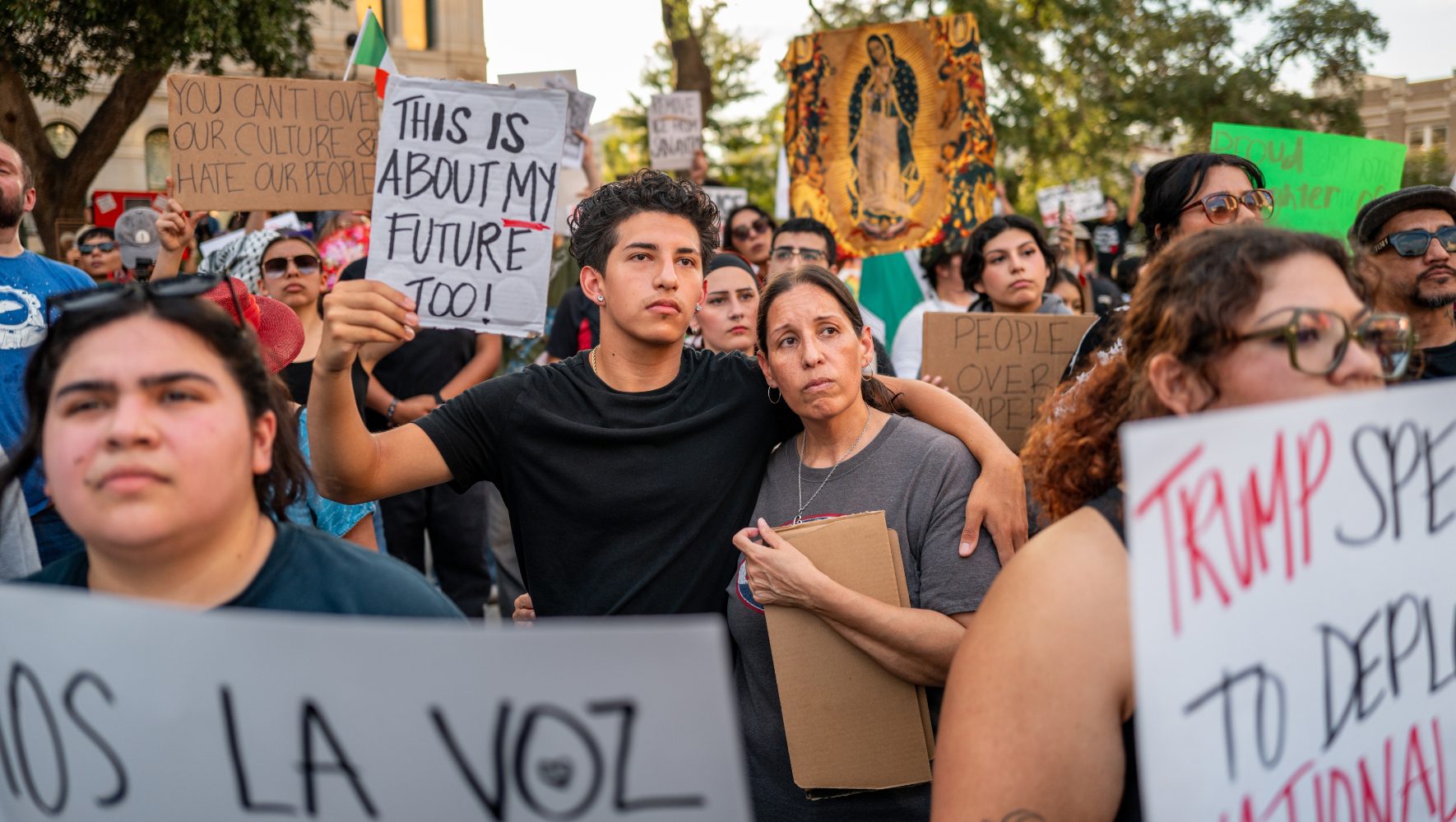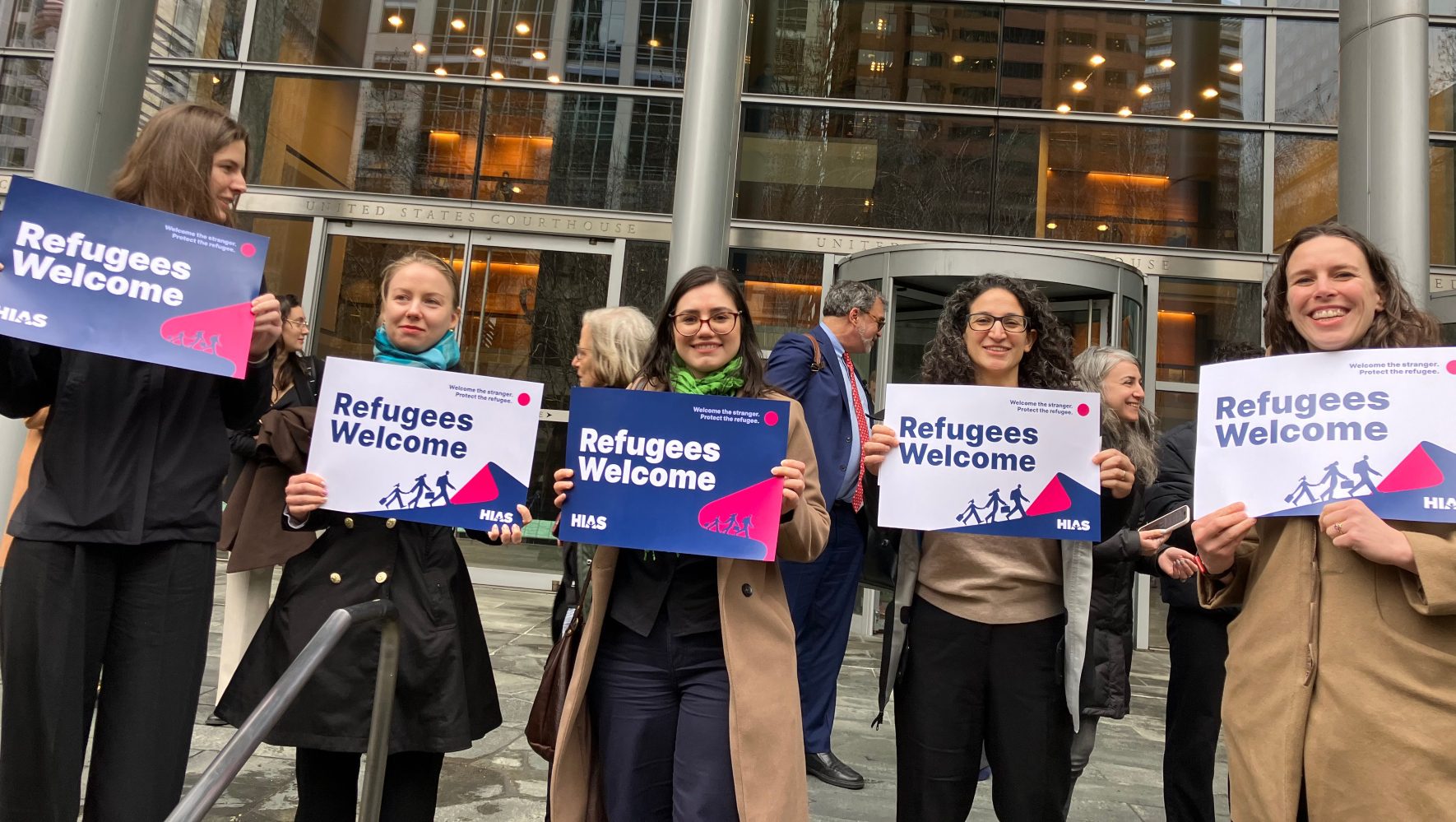Refugee Ceiling, Muslim Ban 3.0 and the Supreme Court
By Gabe Cahn, HIAS.org
Sep 28, 2017

Religious leaders and activists from the Church World Service hold up a door, closed to refugees, during a protest urging congress to pressure President Donald Trump to allow more refugees to enter in front of the capitol in Washington, D.C. on September 27, 2017.
(Andrew Caballero-Reynolds/AFP/Getty Images)
It’s been a busy few days for those fighting to keep America a welcoming country.
The Muslim ban is back in the news, the proposed annual refugee admissions ceiling is the lowest in history and the Supreme Court just cancelled the October 10 hearing for the case HIAS is a co-plaintiff in: Trump v. International Refugee Assistance Project.
But what does this all mean for the refugees? Below is a quick recap of what you need to know and how you can take action.
Refugee Ceiling
On Wednesday, September 27, the Trump administration proposed a refugee resettlement ceiling for Fiscal Year 2018 of 45,000, the lowest number ever set by any president since the Refugee Act became law in 1980.
This means that a maximum of 45,000 refugees will be able to find safety in the United States in Fiscal Year 2018 (October 1, 2017 through September 30, 2018), but it’s possible the actual number of refugees who are resettled here will be lower.
If the 45,000 figure stands, America’s global leadership on refugees will be tarnished for years to come. And even worse, with less global protection for refugees, millions of innocent human beings who have been forced to flee their countries will now be at even greater risk.
Responding to the recommended admissions cap, HIAS President and CEO Mark Hetfield said, “by setting the refugee number this low, this administration is betraying the commitments we made after World War II – followed by decades of bipartisan support – to ensure that the world never again turns its back on innocent people seeking safety.”
For context, the United States resettled 85,000 refugees in FY2016, and the ceiling for FY2017 was set at 110,000 before the Trump administration attempted to cap it at 50,000 through two executive orders.
It’s also important to remember that we are in the midst of the worst global refugee crisis in recorded history and less than one percent of the world’s more than 20 million refugees will even have the chance at resettlement.
But Congress has the authority to step in. HIAS, our supporters and other refugee organizations are urging Congress to pass legislation to welcome refugees at a level proportionate to the crisis and in line with our capacity, history and values.
Muslim Ban 3.0
On Sunday, September 24, the Trump administration issued a Presidential Proclamation with new travel restrictions for nationals of Chad, Iran, Libya, North Korea, Syria, Venezuela, and Yemen.
The new order from the White House, which followed the expiration of the March 6 travel ban, does not explicitly impact refugees. But like the prior two executive orders banning travelers, it will primarily affect citizens of Muslim-majority countries. Unlike both the January 27 and March 6 executive orders, which were temporary, this ban is indefinite.
Vox’s Tara Golshen explains, “the order overwhelmingly bars tourists, families of American residents, and even those seeking medical visas from entering the United States. Those who already have permanent residency or already hold visas are exempted from the ban — but cannot renew their visas after they expire.”
Immigration and refugee advocates are planning a #NoMuslimBanEver march in Washington, D.C. on October 18, the day the new ban is scheduled to go into effect, to demonstrate strong opposition to this policy. HIAS and Bend the Arc are partnering to lead the American Jewish community’s participation at the event. Click here for more information.
The Supreme Court
On Monday, September 25, following the announcement of the new travel ban, the Supreme Court removed Trump v. International Refugee Assistance Project from the oral argument calendar. HIAS is a co-plaintiff in this case, which is challenging the constitutionality of the Trump administration’s March 6 executive order.
The parties are now required to submit briefs by October 5 to determine the impact of the latest proclamation amending the previous executive order. While the new travel ban does not affect refugees, the 120-day refugee ban included in the March 6 executive order is set to come to a close soon. The Court asked parties to address this as well.
In a joint statement with the plaintiffs and counsel, Omar Jadwat, director of the ACLU’s Immigrants’ Rights Project said, “this action by the Supreme Court is not surprising given the government’s decision to issue a new version of the ban at the eleventh hour.”
“Both sides will address the implications of that new ban order for the existing case in written submissions to the court,” he added. “The ban has been repeatedly held unconstitutional and illegal by the courts, and those decisions remain in place today.”
To stay up to date on all the latest news on HIAS’ litigation against the ban, follow us on Facebook, Twitter and Instagram.



